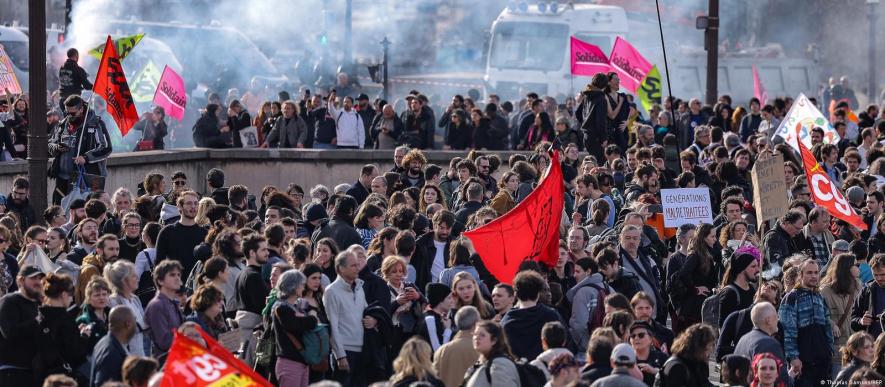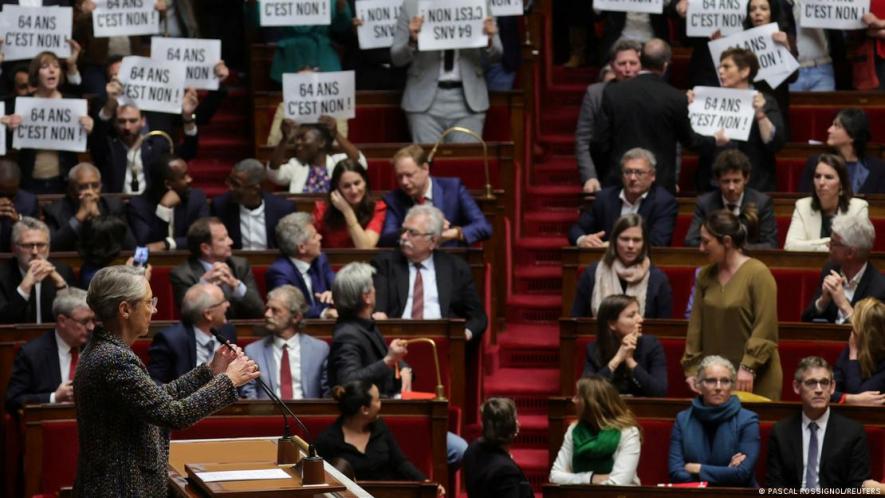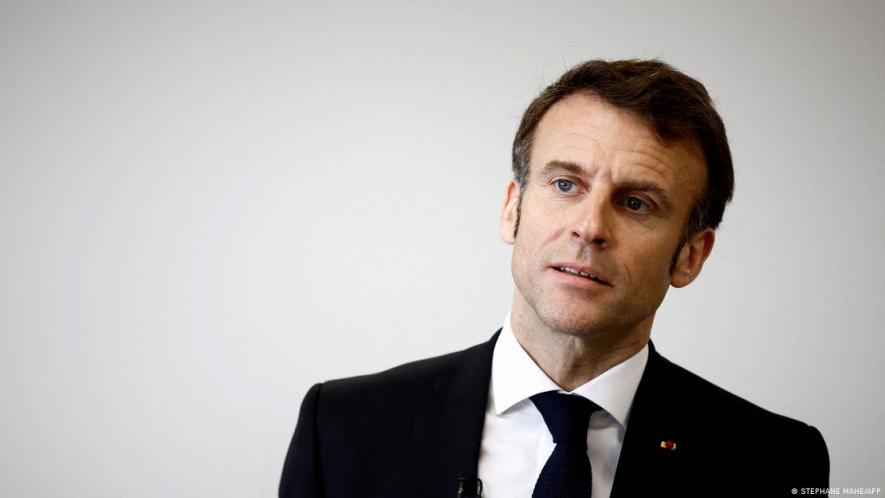France: Pension Reform Spells Crisis For Macron

It was an extraordinary scene that epitomized the political storm France has walked into.
As Prime Minister Elisabeth Borne was making her way to the National Assembly's podium Thursday afternoon, lawmakers from the opposition stood up, chanting the Marseillaise and holding signs saying "no to 64 years" and "democracy."
The Assembly's president interrupted the session for things to calm down.
But when Borne took the floor a few minutes later, she still had to drown out the parliamentarians' boos.
"Based on article 49.3 of the constitution, I engage the government's responsibility," she yelled, announcing that a controversial pension reform increasing France's minimum retirement age from 62 to 64 years would be pushed through without a vote in the lower house of parliament.

"No to 64 years!" Prime Minister Borne was faced with protest from parliamentarians as she announced the pension reform
'Something's not right in the French political system'
Paragraph 3 of Article 49 allows the prime minister to act unilaterally. The only way to stop a bill that was passed under this rule would be to bring down the government.
"What happened was absolutely unheard of ― it was terrible to see how the National Assembly went completely crazy," Bruno Cautres from Paris-based think tank Centre for Political Research told DW.
Headwinds against what was by many perceived as an authoritarian move were also blowing outside the parliament, following weeks of protests against the pension reform.
Thousands of demonstrators took to the streets of Paris and other cities across the country, some of them staying late into the night and clashing with riot police. Further protests are expected over the weekend.
"This highlights that something's not right in the French political system ― we can see that in our regular polls, which show that people want a more participative democracy where unions and civil society are involved in the elaboration of legal texts," Cautres said.
Opposition parties have filed two no-confidence motions that will be put to the vote on Monday.
Will the government to survive the no-confidence vote?
The French government has received the support of the leaders of the conservative Republicans. Their 60 votes would give President Emmanuel Macron's minority coalition the needed majority to fend off the no-confidence votes.
And yet, the same leaders had already pledged their party's backing for the pension reform. But not enough Republicans agreed to follow that lead, which is why President Macron deemed a parliamentary majority for his reform unlikely and decided to trigger the 49.3.
Vincent Martigny, a professor for political science at Nice University and Paris-based Ecole Polytechnique, thinks the move has plunged France into a political crisis that is here to stay, at least in the medium term.
While President Macron's job is not directly threatened, running the country seems set become a headache.
Government is 'fatally injured'
"The government in its current form is fatally injured, just like during a corrida, a bullfight," Martigny said to DW, adding that PM Borne would almost certainly have to step down.
"If one of the no-confidence votes gets through, the government will fall and the president is likely to dissolve the National Assembly," Martigny said.
"If the government survives the vote, Macron can either withdraw the reform, which seems highly unlikely, or stick to it, which will spark a social crisis with consequences unknown that could include snap parliamentary elections," he added.
The president, meanwhile, argues France needs the reform to maintain its financial credibility on international markets, where it refinances its debt that stands at about 110 percent of France's GDP.
"I consider that the financial and economic risks [of not carrying out the reform] are too big," Macron said in front of the cabinet on Thursday, as per a statement from his office.
"But as opposed to people in countries like Germany, the French don't care about public debt – for them, it's a side issue," Martigny underlined.

Macron's path ahead is unclear after he pushed through his unpopular pension reform
A country with 'welfare nationalism'
The pension system, by contrast, lies at the heart of their concerns.
"The French practice what I'd call welfare nationalism ― they are very attached to their system of redistribution and consider it as a crucial part of their identity," Martigny said.
He added that even in politically stable times, it was a challenge to carry out welfare reforms in France.
"But we are in dire economic times with a war in Ukraine and rising inflation. On top of that, Macron has hardly negotiated with the unions and wants to push the reform through by force," Martigny said. "All this is causing a huge uproar."
Is there a way out of the political crisis?
Cautres from the Centre for Political Research thinks the only way for Macron to get back into calmer political waters in the medium term is to reach a majority in parliament.
"Either he forms a stable coalition agreement with the Republicans or he dissolves the National Assembly hoping for a better result in the subsequent parliamentary elections," the expert said.
But Benjamin Morel, a political analyst and lecturer for public law at University Paris 2 Panthéon-Assas, doubts these strategies will work.
"The Republicans are not reliable partners ― they seem to be a group of free electrons without much party discipline," he told DW.
And snap parliamentary elections could harbor another risk.
"The far right is likely to gain ground, as it has managed to build up a respectable image during the debates in parliament while being against the reform and on the side of the people. And democratic fatigue, as we are seeing it now, often leads to either abstention or a vote for the extremes," Morel said.
Edited by: Carla Bleiker
Get the latest reports & analysis with people's perspective on Protests, movements & deep analytical videos, discussions of the current affairs in your Telegram app. Subscribe to NewsClick's Telegram channel & get Real-Time updates on stories, as they get published on our website.
























